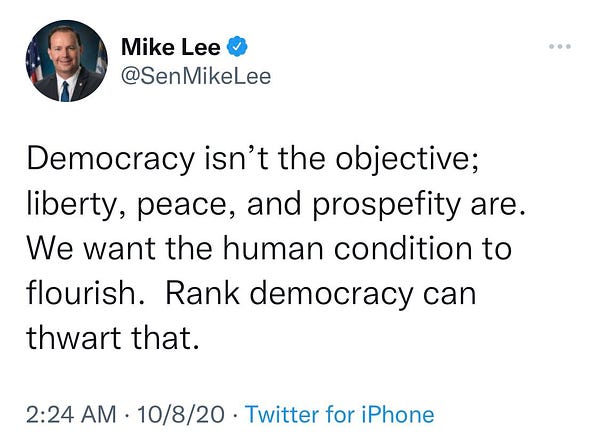
Early in the morning of April 15, 1865, President Abraham Lincoln breathed his last. The night before, he and his wife had gone to see a play—a comedy. One of the last men to talk to him before he left for the theater said it seemed the cares of the previous four years were melting away. The Confederacy was all but defeated, and the nation seemed to be on its way to a prosperous, inclusive new future.
The bullet that killed Lincoln had been delivered by John Wilkes Booth, a famous actor poisoned by the belief that Lincoln’s use of the federal government to end human enslavement as a central part of the nation’s economy was tyranny.
Since the 1830s, southern Democratic leaders had gotten around the sticky problem of the Declaration of Independence, with its insistence that “all men are created equal,” by insisting that democracy simply meant that men could elect their leaders at the state level. If voters chose to do unpopular things—like take Indigenous lands, enslave their Black neighbors, or impose taxes on Mexicans and Chinese and not on white men—that was their prerogative. Even if the vast majority of the U.S. population opposed those state laws, there was nothing the federal government could do to change them.
The only thing the national government could do was to protect property, and that power was expansive: in 1859, enslavers would demand that the government take the extraordinary step of enforcing enslavement in the western territories. But, they insisted, the government had no power to do anything else. It could do nothing that the Framers had not enumerated in the Constitution, even if the vast majority of Americans wanted it to establish colleges for poor men, for example, or lay a road across the Cumberland Gap for western migrants, or dredge the harbors where trading schooners kept commerce flowing.
To men like Lincoln, the men who organized the Republican Party, this simply made no sense. By its very nature, such an argument concentrated such wealth and power in a few men that the Republicans talked constantly of “oligarchy.”
The point of a democratic government, they believed, was to answer the will of the majority of voters in the whole country. During the Civil War, the Republicans used the government to provide homesteads for settlers, create public colleges, distribute seeds (no small thing in an era when seeds were handed down in families and poor men often had no access to such legacies), charter a national railroad, invent national taxation, and—finally—end systemic human enslavement.
This system was wildly popular, but those determined to retain control of their states insisted it was tyranny. No longer able to manipulate the political system in their favor, they turned to violence. “Sic semper tyrannis!”— thus always to tyrants— Booth yelled from the stage at Ford’s Theater, after pulling the trigger.
The old Democratic argument for state’s rights has reemerged in the present-day Republican Party, and it has taken on many of the same contours as it had in the 1850s. Adherents are operating in a false reality, believing that their vision of the nation is the only correct one, and that they must impose their will on the rest of us, no matter what we want. As Senator Mike Lee (R-UT) tweeted on October 8, 2020, “Democracy isn’t the objective; liberty, peace, and prospe[r]ity are. We want the human condition to flourish. Rank democracy can thwart that.”
That fear of democracy has brought us to the edge of losing our government. In an exclusive story today by Ryan Nobles, Annie Grayer, Zachary Cohen, and Jamie Gangel, CNN published 100 text messages between Senator Lee, Representative Chip Roy of Texas, and Trump’s White House chief of staff Mark Meadows. The messages were obtained by the House Select Committee to Investigate the January 6th Attack on the U.S. Capitol.
They show elected members of our government eager to overturn the legitimate results of the 2020 election in which a national majority of 7 million people had chosen Democrat Joe Biden as president. On November 7, acting on the false narrative the Trump administration had established months before that the election would be marked by fraud, Lee was one of a number of right-wing lawmakers and leaders who offered to Trump their "unequivocal support for you to exhaust every legal and constitutional remedy at your disposal to restore Americans faith in our elections." On November 9, Lee told Meadows he was working to bring senators around to the idea of challenging the election. Roy wrote that they needed evidence of fraud: “We need ammo. We need fraud examples. We need it this weekend.”
Gradually, though, Lee and Roy became concerned that the administration was long on accusations and short on evidence. On November 19, Trump’s public legal team—Sidney Powell, Rudy Giuliani, and Jenna Ellis—gave a press conference that was full of wild accusations, all of which were false, that might well have been designed simply to whip up Trump’s base for later attacks on the counting of electoral votes. (Trump’s team lost more than 60 lawsuits over the election, and when Dominion Voting Systems sued Powell for $1.3 billion over her accusations that their software flipped votes, her legal team argued that “reasonable people would not accept such statements as fact.”)
In the wake of the conference, Lee worried that “the potential defamation liability for the president is significant here. For the campaign and the president personally. Unless Powell can back up everything she said, which I kind of doubt she can.” He believed the press conference was damaging enough that the president “should probably disassociate himself and refute any claims that can't be substantiated.” On November 22, he begged Meadows: “Please tell me what I should be saying.” Roy wrote: “If we don’t get logic and reason in this before 11/30—the GOP conference will bolt (all except the most hard core Trump guys).”
Lee and Roy then turned to lawyer John Eastman’s plan to have states appoint “alternative slates of electors” in place of the legitimate, certified ones. By January 3, Lee specified that those new slates must be named “pursuant to state law,” and started calling state legislators.
In the end, Lee and Roy came to see that the fight to keep Trump in power was unconstitutional. On December 31, Roy wrote: “The President should call everyone off. It's the only path. If we substitute the will of states through electors with a vote by Congress every 4 years...we have destroyed the electoral college... Respectfully.” On January 1, he added: “If POTUS allows this to occur...we’re driving a stake in the heart of the federal republic….”
On January 4, Roy had abandoned the attack on the federal government, but other Republicans persisted. Roy texted: “I am truly sorry I am in a different spot then you and our brothers re: Wednesday. But I will defend all.” On January 6, during the riot, he texted: “This is a sh*tshow…. Fix this now.”
“We are,” Meadows texted. Later that night, 8 senators and 139 representatives nonetheless voted to challenge certified state electoral votes electing Biden.
Since January 6, the Republican Party has shifted its focus to the states to undermine the federal government. Nineteen states have changed their election laws to enable Republicans to win their states regardless of the will of the voters, sending Republican electors to put a Republican president in place. Encouraged by the Supreme Court’s “originalist” majority, which denies the ability of the federal government to protect civil rights in the states, Florida, Mississippi, Kentucky, Oklahoma, and Texas have all overridden the constitutional right to abortion, and Republican lawmakers have indicated they are gunning for birth control and interracial marriage as well. Dramatically, in the last week. Texas governor Greg Abbott has effectively shut down international trade across the U.S.-Mexico border, explicitly asserting state power over national power and thus driving prices up all across the country.
One hundred and fifty-seven years ago today, Lincoln’s secretary of war, Edwin Stanton, stood heartbroken by the bedside of the man who had asserted the power of the federal government over the states and said, “Now he belongs to the ages.”
—
Notes:


https://apnews.com/article/dominion-lawsuit-sidney-powell-0031ce89ba24bdeae0402861e20ede69
https://www.nytimes.com/article/abortion-laws-us.html
https://www.cnn.com/2022/04/15/politics/read-mark-meadows-texts-mike-lee-chip-roy/index.html











Sometimes it is very, very difficult to tap that “heart” emoji. I do not love to read what is so horrifying and real. But I love that you are writing it with such clarity and truth and intelligence. Thank you, with all my heart.
“Now, he belongs to the ages.... “ memorializes President Lincoln’s death. I’d add, he belongs to us and to our children.
Tonight’s Letter suggests our republic may soon belong to the ages. Putin and Trump would be thrilled. And all this started with - slavery and the Black wet nurse much loved.
To Justice Ketanji Brown Jackson, may God bless her brave and honest heart.